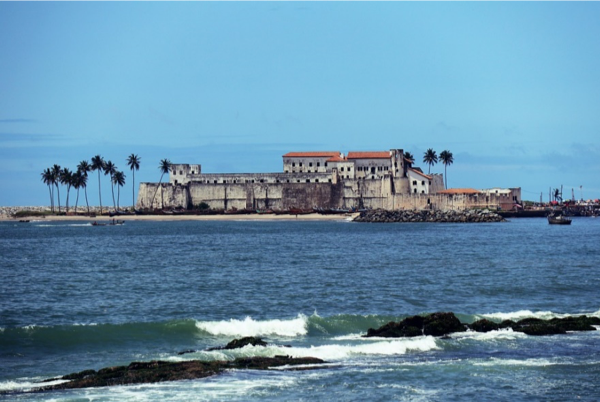African nations have been building on black diaspora identity to promote tourist destinations. – Ryan Muza
From colonial trading post, to staging area for the mid-Atlantic slave trade to… tourist destination?
Constructed by the Portuguese in 1482 under the name of São Jorge da Mina, Elmina Castle was the first major European building erected in tropical Africa[1]. Situated on the Gold Coast, the castle has known many functions, including a trading post (notably in the trading of slaves), a secondary school, the office of the Ghana Education Service and a police training academy[2]. As part of Ghana’s economic policy, locations such as this have been acquisitioned by locals and displayed as items of Ghanaian heritage available for tourist consumption. Castles involved in the mid-Atlantic slave trades are among the most popular tourist attractions in Ghana,[3] Elmina more than others due to its status as a UNESCO World Heritage Site.
The ‘touristification’ of the black diaspora?
As part of the touristification of the castle, the Ghanaian Tourist Board needed to choose which part of history to present to visitors. It was decided to focus on the destination’s symbolism as an emblem of black diaspora identity, a notion promulgated by African-Americans (who represent the majority of diaspora black tourists)[4]. For diaspora blacks, the destination promotes the notions of returning to the motherland, and the castle offers tourists the chance to visit the slave dungeons, which have been preserved due to popular demand. However, the basis of identity upon which the destination is founded is not necessarily shared by domestic tourists, who perceive the castle (and the tourists themselves) in quite a different manner than do the diaspora tourists.[5]
Ryan Muza
[1] Owusu-Ansah, D. (2014), p.137
[2] Bruner, Edward M., (1996)
[3] Owusu-Ansah, D. (2014), p.137
[4] Bruner, Edward M., (1996) p292
[5] Ibid
Bruner, Edward M., (1996), ‘Tourism in Ghana: The Representation of Slavery and the Return of the Black Diaspora’, American Anthropologist, 98:2
Owusu-Ansah, D. (2014). ‘Historical Dictionary of Ghana’ (4th ed). Lanham : Rowman & Littlefield
